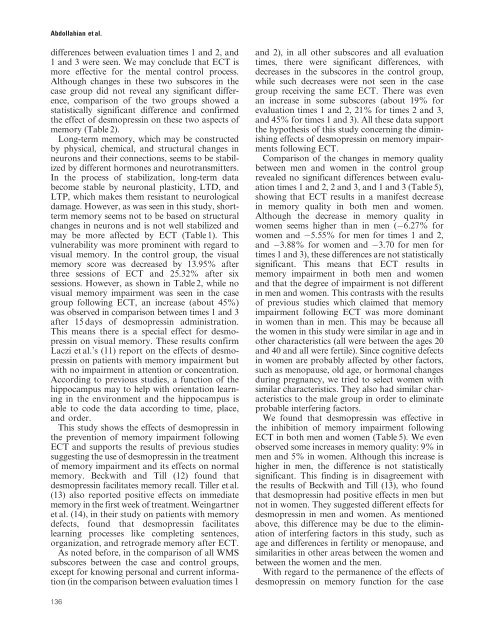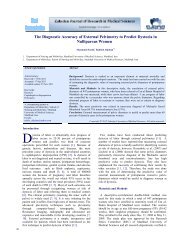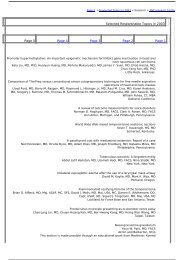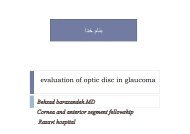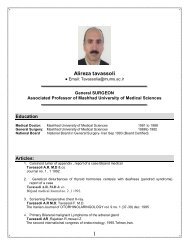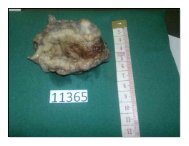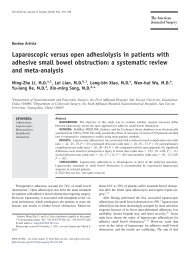Effects of desmopressin (DDAVP) on memory impairment following ...
Effects of desmopressin (DDAVP) on memory impairment following ...
Effects of desmopressin (DDAVP) on memory impairment following ...
Create successful ePaper yourself
Turn your PDF publications into a flip-book with our unique Google optimized e-Paper software.
Abdollahian et al.<br />
differences between evaluati<strong>on</strong> times 1 and 2, and<br />
1 and 3 were seen. We may c<strong>on</strong>clude that ECT is<br />
more effective for the mental c<strong>on</strong>trol process.<br />
Although changes in these two subscores in the<br />
case group did not reveal any significant difference,<br />
comparis<strong>on</strong> <str<strong>on</strong>g>of</str<strong>on</strong>g> the two groups showed a<br />
statistically significant difference and c<strong>on</strong>firmed<br />
the effect <str<strong>on</strong>g>of</str<strong>on</strong>g> <str<strong>on</strong>g>desmopressin</str<strong>on</strong>g> <strong>on</strong> these two aspects <str<strong>on</strong>g>of</str<strong>on</strong>g><br />
<strong>memory</strong> (Table 2).<br />
L<strong>on</strong>g-term <strong>memory</strong>, which may be c<strong>on</strong>structed<br />
by physical, chemical, and structural changes in<br />
neur<strong>on</strong>s and their c<strong>on</strong>necti<strong>on</strong>s, seems to be stabilized<br />
by different horm<strong>on</strong>es and neurotransmitters.<br />
In the process <str<strong>on</strong>g>of</str<strong>on</strong>g> stabilizati<strong>on</strong>, l<strong>on</strong>g-term data<br />
become stable by neur<strong>on</strong>al plasticity, LTD, and<br />
LTP, which makes them resistant to neurological<br />
damage. However, as was seen in this study, shortterm<br />
<strong>memory</strong> seems not to be based <strong>on</strong> structural<br />
changes in neur<strong>on</strong>s and is not well stabilized and<br />
may be more affected by ECT (Table 1). This<br />
vulnerability was more prominent with regard to<br />
visual <strong>memory</strong>. In the c<strong>on</strong>trol group, the visual<br />
<strong>memory</strong> score was decreased by 13.95% after<br />
three sessi<strong>on</strong>s <str<strong>on</strong>g>of</str<strong>on</strong>g> ECT and 25.32% after six<br />
sessi<strong>on</strong>s. However, as shown in Table 2, while no<br />
visual <strong>memory</strong> <strong>impairment</strong> was seen in the case<br />
group <strong>following</strong> ECT, an increase (about 45%)<br />
wasobservedincomparis<strong>on</strong>betweentimes1and3<br />
after 15 days <str<strong>on</strong>g>of</str<strong>on</strong>g> <str<strong>on</strong>g>desmopressin</str<strong>on</strong>g> administrati<strong>on</strong>.<br />
This means there is a special effect for <str<strong>on</strong>g>desmopressin</str<strong>on</strong>g><br />
<strong>on</strong> visual <strong>memory</strong>. These results c<strong>on</strong>firm<br />
Laczi et al.’s (11) report <strong>on</strong> the effects <str<strong>on</strong>g>of</str<strong>on</strong>g> <str<strong>on</strong>g>desmopressin</str<strong>on</strong>g><br />
<strong>on</strong> patients with <strong>memory</strong> <strong>impairment</strong> but<br />
with no <strong>impairment</strong> in attenti<strong>on</strong> or c<strong>on</strong>centrati<strong>on</strong>.<br />
According to previous studies, a functi<strong>on</strong> <str<strong>on</strong>g>of</str<strong>on</strong>g> the<br />
hippocampus may to help with orientati<strong>on</strong> learning<br />
in the envir<strong>on</strong>ment and the hippocampus is<br />
able to code the data according to time, place,<br />
and order.<br />
This study shows the effects <str<strong>on</strong>g>of</str<strong>on</strong>g> <str<strong>on</strong>g>desmopressin</str<strong>on</strong>g> in<br />
the preventi<strong>on</strong> <str<strong>on</strong>g>of</str<strong>on</strong>g> <strong>memory</strong> <strong>impairment</strong> <strong>following</strong><br />
ECT and supports the results <str<strong>on</strong>g>of</str<strong>on</strong>g> previous studies<br />
suggesting the use <str<strong>on</strong>g>of</str<strong>on</strong>g> <str<strong>on</strong>g>desmopressin</str<strong>on</strong>g> in the treatment<br />
<str<strong>on</strong>g>of</str<strong>on</strong>g> <strong>memory</strong> <strong>impairment</strong> and its effects <strong>on</strong> normal<br />
<strong>memory</strong>. Beckwith and Till (12) found that<br />
<str<strong>on</strong>g>desmopressin</str<strong>on</strong>g> facilitates <strong>memory</strong> recall. Tiller et al.<br />
(13) also reported positive effects <strong>on</strong> immediate<br />
<strong>memory</strong> in the first week <str<strong>on</strong>g>of</str<strong>on</strong>g> treatment. Weingartner<br />
et al. (14), in their study <strong>on</strong> patients with <strong>memory</strong><br />
defects, found that <str<strong>on</strong>g>desmopressin</str<strong>on</strong>g> facilitates<br />
learning processes like completing sentences,<br />
organizati<strong>on</strong>, and retrograde <strong>memory</strong> after ECT.<br />
As noted before, in the comparis<strong>on</strong> <str<strong>on</strong>g>of</str<strong>on</strong>g> all WMS<br />
subscores between the case and c<strong>on</strong>trol groups,<br />
except for knowing pers<strong>on</strong>al and current informati<strong>on</strong><br />
(in the comparis<strong>on</strong> between evaluati<strong>on</strong> times 1<br />
136<br />
and 2), in all other subscores and all evaluati<strong>on</strong><br />
times, there were significant differences, with<br />
decreases in the subscores in the c<strong>on</strong>trol group,<br />
while such decreases were not seen in the case<br />
group receiving the same ECT. There was even<br />
an increase in some subscores (about 19% for<br />
evaluati<strong>on</strong> times 1 and 2, 21% for times 2 and 3,<br />
and 45% for times 1 and 3). All these data support<br />
the hypothesis <str<strong>on</strong>g>of</str<strong>on</strong>g> this study c<strong>on</strong>cerning the diminishing<br />
effects <str<strong>on</strong>g>of</str<strong>on</strong>g> <str<strong>on</strong>g>desmopressin</str<strong>on</strong>g> <strong>on</strong> <strong>memory</strong> <strong>impairment</strong>s<br />
<strong>following</strong> ECT.<br />
Comparis<strong>on</strong> <str<strong>on</strong>g>of</str<strong>on</strong>g> the changes in <strong>memory</strong> quality<br />
between men and women in the c<strong>on</strong>trol group<br />
revealed no significant differences between evaluati<strong>on</strong><br />
times 1 and 2, 2 and 3, and 1 and 3 (Table 5),<br />
showing that ECT results in a manifest decrease<br />
in <strong>memory</strong> quality in both men and women.<br />
Although the decrease in <strong>memory</strong> quality in<br />
women seems higher than in men ( 6.27% for<br />
women and 5.55% for men for times 1 and 2,<br />
and 3.88% for women and 3.70 for men for<br />
times 1 and 3), these differences are not statistically<br />
significant. This means that ECT results in<br />
<strong>memory</strong> <strong>impairment</strong> in both men and women<br />
and that the degree <str<strong>on</strong>g>of</str<strong>on</strong>g> <strong>impairment</strong> is not different<br />
in men and women. This c<strong>on</strong>trasts with the results<br />
<str<strong>on</strong>g>of</str<strong>on</strong>g> previous studies which claimed that <strong>memory</strong><br />
<strong>impairment</strong> <strong>following</strong> ECT was more dominant<br />
in women than in men. This may be because all<br />
the women in this study were similar in age and in<br />
other characteristics (all were between the ages 20<br />
and 40 and all were fertile). Since cognitive defects<br />
in women are probably affected by other factors,<br />
such as menopause, old age, or horm<strong>on</strong>al changes<br />
during pregnancy, we tried to select women with<br />
similar characteristics. They also had similar characteristics<br />
to the male group in order to eliminate<br />
probable interfering factors.<br />
We found that <str<strong>on</strong>g>desmopressin</str<strong>on</strong>g> was effective in<br />
the inhibiti<strong>on</strong> <str<strong>on</strong>g>of</str<strong>on</strong>g> <strong>memory</strong> <strong>impairment</strong> <strong>following</strong><br />
ECT in both men and women (Table 5). We even<br />
observed some increases in <strong>memory</strong> quality: 9% in<br />
men and 5% in women. Although this increase is<br />
higher in men, the difference is not statistically<br />
significant. This finding is in disagreement with<br />
the results <str<strong>on</strong>g>of</str<strong>on</strong>g> Beckwith and Till (13), who found<br />
that <str<strong>on</strong>g>desmopressin</str<strong>on</strong>g> had positive effects in men but<br />
not in women. They suggested different effects for<br />
<str<strong>on</strong>g>desmopressin</str<strong>on</strong>g> in men and women. As menti<strong>on</strong>ed<br />
above, this difference may be due to the eliminati<strong>on</strong><br />
<str<strong>on</strong>g>of</str<strong>on</strong>g> interfering factors in this study, such as<br />
age and differences in fertility or menopause, and<br />
similarities in other areas between the women and<br />
between the women and the men.<br />
With regard to the permanence <str<strong>on</strong>g>of</str<strong>on</strong>g> the effects <str<strong>on</strong>g>of</str<strong>on</strong>g><br />
<str<strong>on</strong>g>desmopressin</str<strong>on</strong>g> <strong>on</strong> <strong>memory</strong> functi<strong>on</strong> for the case


